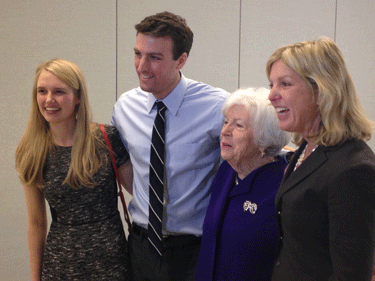 |
|
| SOM class speaker Daniel Maselli with his girlfriend, Hillary Fitzgerald, far left. Pictured with them at Match Day are Agnes and Kate Barry, Maselli’s grandmother and mother. |
Since elementary school, Daniel Maselli has held the idea of a physician as a sort of ideal in his mind, the ultimate connection of head and heart. When he graduates from the School of Medicine on Sunday, May 31, he will be well on his way to achieving that ideal, although not in the way he once thought he would.
Chosen by his classmates to represent them as class speaker, Maselli hopes to make them laugh, but he also hopes to convey the importance of acknowledging the role uncertainty plays in day-to-day life, practice and learning.
“The culture of medicine embodies a self-imposed—or maybe externally imposed—self-assuredness. I want to talk about the role of uncertainty in making us good doctors,” said Maselli. “My reasons for wanting to become a doctor have evolved as I’ve figured out more and more what it’s like to be one. I still like the idea of using knowledge to help others, but now there are other elements I never realized were there in the first place—a career of life-long learning and life-long teaching. One of the best—and sometimes overwhelming—parts of this medical education is that it’s never really over.”
Uncertainty also played a role in his decision to pursue a career in internal medicine. When he came to medical school, he thought he wanted to be a neurosurgeon, the kind of doctor who would “fix” patients in a dramatic and tangible way. He realized over time, though, that helping patients make small improvements that allowed them to take part in the simple interactions that comprise a life was just as fulfilling. And important.
“I soon learned that this was no less of a success for the patient and no less of a privilege for us,” Maselli wrote in his residency application. “In doing so, we allowed a 72-year-old painter with renal failure to attend his granddaughter’s wedding, a 50-year-old gentleman with emphysema to enjoy his son’s mashed potatoes at Thanksgiving dinner, and a spry 84-year-old widow with pneumonia to rejoin the warm companionship of her seven Himalayan cats. We helped a score of other patients return . . . to the aspects of their lives that made the hospital such a nice place to leave.”
It was also during his internal medicine rotation that Maselli saw the power of life-long learning in action. While he was inspired by the attending physicians’ broad knowledge, he was invigorated by the willingness of team members to admit their own limitations in the spirit of learning. It was during this rotation that Maselli saw the kind of clinician he wanted to be—kind, patient, humble and committed to a lifetime of scholarship.
Maselli plans to make medical education a part of that “lifetime of scholarship.” In addition to the opportunities to teach fellow medical students in the classes below him through the SOM house system, he was inspired by house mentor Michael Ennis, MD, associate professor of medicine and learning communities co-director, calling him “a champion for students.”
After graduation, Maselli will be headed to a residency at Duke University Medical Center in Durham, N.C., where he will be reunited with his girlfriend, Hillary Fitzgerald, who will be a fourth-year medical student at Wake Forest School of Medicine. The two met senior year of high school and both attended Princeton.